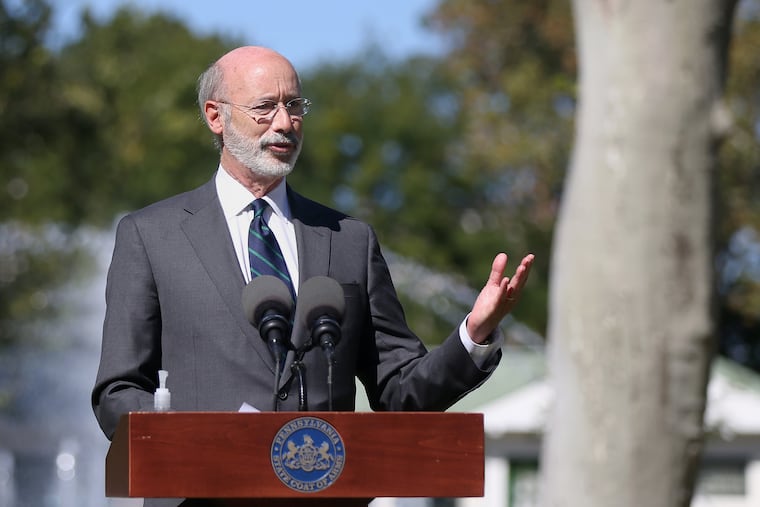The Wolf administration won’t appeal a state court ruling that tossed victim-rights law overwhelmingly supported by voters
Gov. Tom Wolf’s administration, which supported the legislation, could have appealed the decision to the state’s high court.

After years of political wrangling and legal battles, a Pennsylvania court last month threw out a controversial constitutional amendment aimed at bolstering the rights of crime victims — one that was supported by an overwhelming majority of voters.
Gov. Tom Wolf’s administration has defended the proposal, called Marsy’s Law, and could have appealed the decision to the state Supreme Court.
But on Tuesday, officials said the governor’s administration has decided not to, effectively removing the state from the appeals process.
Wolf spokesperson Lyndsay Kensinger said in a statement “after a thorough reading of the commonwealth court’s ruling, the administration supports efforts to achieve constitutional protections for victims through an amendment that better aligns with the constitution’s procedural requirements.”
The state chapter of a national group, Marsy’s Law for Pennsylvania, did file a notice of appeal last month on behalf of four voters and plans to move forward with the case, even without the backing of the governor. The group’s director, Jennifer Riley, said the governor’s decision has “absolutely no bearing on our legal case.”
“We are going to continue to do what we do, and that’s represent the voters and the survivors of Pennsylvania,” she said. “We do have the support of the attorney general and bipartisan support from across the state.”
A spokesperson for Josh Shapiro said that he “fully supports Marsy’s Law and intends to weigh in with the court, in his capacity as attorney general, as the case continues through the legal process.”
Marsy’s Law guarantees rights for crime victims and their families, including having the right to be notified about case developments and plea bargains; to provide statements during proceedings related to release and parole; and to refuse an interview or discovery request made by, or on behalf of, the accused.
Some of those rights are already guaranteed under state law, but advocates in favor of Marsy’s Law say enshrining them in the state’s constitution would give crime victims better standing in court and provide an enforcement mechanism.
» READ MORE: Marsy's Law, explained: Here's what's in the controversial Pennsylvania victim-rights law
The Commonwealth Court ruled last month in a 3-2 decision that the amendment, passed with the support of three-quarters of voters during a November 2019 referendum, changed too many things in the state constitution at once. It agreed with the League of Women Voters, which filed suit against now-former Secretary of State Kathy Boockvar, claiming the proposed amendment was too broad and didn’t allow Pennsylvanians to vote only for the aspects they approved of.
Boockvar resigned this month after the Department of State botched a separate constitutional amendment process that would have allowed survivors of sex crimes to sue both abusers and the institutions that covered up decades-old abuse.
In the Marsy’s Law case, the League of Women Voters was supported by the ACLU, which has roundly criticized the provision as infringing on the accused’s right to due process. The court agreed, with Judge Ellen Ceisler writing that allowing a person or victim impacted by a crime to decline to provide discovery or an interview denies the accused of the opportunity to review evidence that “can be critical to building a defense.”
The courts had ruled before on the process the Pennsylvania legislature followed to get Marsy’s Law on the ballot, deciding in 2019 that while the proposed amendment would appear that November, the votes could not be certified until the law’s constitutionality was decided. That decision was the first time a Pennsylvania state court delayed certification of votes to approve a constitutional amendment.
The law was named after Marsalee Nicholas, a California woman who was killed by her ex-boyfriend in 1983. Her brother, now-billionaire Henry Nicholas, ran into his sister’s killer in the grocery store a week after her death and has since crusaded for victims-rights legislation nationwide.